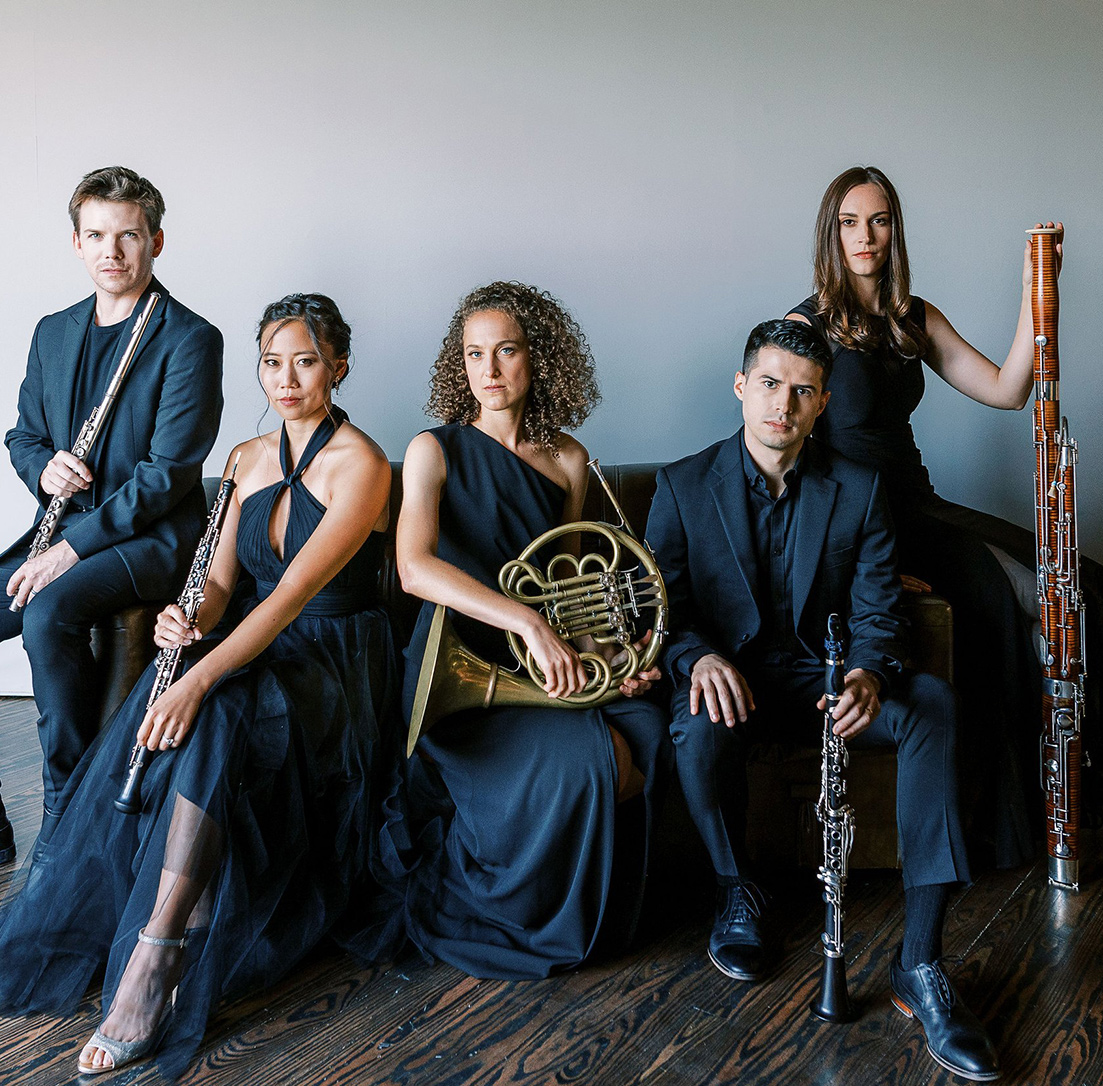WindSync’s concerts are intimate, joyful, and thoughtfully programmed. The quintet eliminates the “fourth wall” by performing from memory, connecting quickly and memorably with audiences. Recent winners of the Concert Artists Guild and Fischoff competitions, they approach their mixed repertory of wind quintets and arrangements with the highest level of artistic dedication. Hear how the flute, oboe, clarinet, horn, and bassoon have evolved from a potpourri of orchestral principals to a much-loved standard chamber music ensemble.
Garrett Hudson, flute
Emily Tsai, oboe
Graeme Steele Johnson, clarinet
Anni Hochhalter, horn
Kara LaMoure, bassoon
This concert is generously supported by

Miguel del Aguila (b. 1978): Sambeada (2022) New York premiere
Miguel del Aguila (b. 1978): Quinteto Sinfónico (2019) New York premiere
Giocoso (Gracioso)
Misterioso
Luminous (Luminoso)
Jean-Philippe Rameau (arr. Kara LaMoure) (1683-1764): Pastoral Suite
Le Rappel des Oiseaux (The Calling of Birds)
Musette & Tambourin
Les Tourbillons (The Whirlwinds)
The Arts and the Hours
Contredanse Très Vive
Edward Elgar (1857-1934): Harmony Music One
Akshaya Avril Tucker (b. 1992): Hold Sacred (2020) New York premiere
Marc Mellits (b. 1966): Apollo (2019)
Theia
Sea of Tranquility
Buzz
Luna Nova
Debbie Waltzing on the Moon
One Small Step
Moonwalk
Valerie Coleman (b. 1970): Umoja (2001)
Program is subject to change
Notes provided by WindSync
Miguel del Aguila (b. 1978): Sambeada (New York premiere)
The musical style of Uruguayan-American composer Miguel del Aguila combines drama, driving rhythms, and nostalgic nods to his South American roots. Miguel del Aguila composed Sambeada for WindSync in June 2022 to commemorate the ensemble’s recent recording project of Del Aguila’s music at Abbey Road Studios in London. This short work is a humorous samba dance that starts cool and relaxed and ends in a rhythmic frenzy. The oboe and French horn players are called to be multi-instrumentalists, performing percussion on the samba rhythm that underlies the piece.
Miguel del Aguila (b. 1978): Quinteto Sinfónico (New York premiere)
About his Quinteto Sinfónico (symphonic quintet), the composer writes: “My inspiration was a technique often used by Andean folk ensembles where wind instruments share and continue each other’s melodies, making them sound as if played by only one performer. Cooperation is more important than showcasing the talent of each individual separately. This turns the music into a spontaneous dialogue.” The three movements of the quintet are: Giocoso, a lopsided Latin dance, Misterioso, which evokes a warm summer night, and Luminous, a bright fanfare. The main themes return throughout the piece, transforming to the mood of each movement and tying the work together.
Jean-Philippe Rameau (arr. Kara LaMoure) (1683 – 1764): Pastoral Suite
Himself an arranger and theorist, Jean-Philippe Rameau would have happily joined in the practice of creating wind quintet adaptations of his works, as WindSync has done with these movements here. Each short piece is taken from one of two sources: the Pièces de clavecin, or pieces for keyboard, and the score to the opera Les Boréades. The title “Pastoral Suite” is not Rameau’s but rather refers to his depiction of natural elements like bird calls, pastures, and weather patterns in the music.
The Pièces de clavecin were composed during Rameau’s early career as a teacher of the keyboard, and besides being useful pedagogical pieces, they formed the basis for his harmonic style. The most successful pieces from these books were later rewritten into Rameau’s works for opera, his most lasting legacy.
Rameau composed his final opera Les Boréades in 1763 at the age of 80. The story, based on Greek mythology and Masonic symbols, is a marriage plot involving a conflict between the gods of the winds. Practically begging to be adapted for wind instruments, the dances from Les Boréades are performed by characters including the Seasons, Zephyrs, and Subterranean Winds.
Edward Elgar (1857-1934): Harmony Music One
The pieces in Elgar’s Harmony Music series embody the social spirit of chamber music. Elgar wrote them for a woodwind quintet that he recruited from among his friends: his brother Frank on oboe, Frank Exton and Hubert Leicester (later to become the mayor of Worcester, England) on flute, and Hubert’s brother William on clarinet. To complete the group, Elgar taught himself to play the bassoon in addition to composing the music for the ensemble. The group rehearsed and performed in the garden shed at the Elgars’ every Sunday afternoon during 1878-79. Harmony Music One is a short movement with humor and freshness fit for a day in the garden, following classical form and featuring harmonies that call to mind Mozart or Haydn.
Akshaya Avril Tucker (b. 1992): Hold Sacred (2020) (New York premiere)
The composer writes:
“The goal of Hold Sacred is to soothe. To hold something sacred to us is soothing; to remember it is soothing.
I mean to hold sacredness literally. Make ‘hold’ a verb. Hold sacred, as you would a baby chick, a tiny plant, a memory, or someone’s hand. The gentleness comes from the desire to protect this dear object, to stay in this comfort for a while…
With the task of meditating on the concept of ‘sacredness’ for WindSync, I had to ask what was sacred to me personally. The answer was to ‘touch and feel’ things. Repotting plants. Kneading bread dough. Giving a hug, when possible. Fewer think-y things. These sensations keep me going mentally. They heal anxiety, like a magical antidote, some special serotonin, while the memory of who and what I cannot physically hold is difficult.
We may only create a few moments of soothing sounds together, and then…we will go right back to the way things are. But maybe just for a moment, we can hold this feeling in our hands.
Hold Sacred features a blend of abstracted raga-inspired fragments that swirl through unusual harmonies and (hopefully) invite a meditation on whatever is most soothing to the listener.”
Marc Mellits (b. 1966): Apollo (2019)
Marc Mellits is one of the most performed living American composers, enjoying hundreds of performances throughout the world every year. His music is eclectic, all-encompassing, and colorful. Mellits often constructs his pieces as sets of short, contrasting movements that explore a single subject. His unique musical forms alternate driving rhythms with soaring lyricism. WindSync commissioned Mellits in 2019 to write Apollo, a piece commemorating the 50th anniversary of the Apollo 11 lunar landing. Apollo comprises seven short movements that present a kaleidoscopic view, from the famous phrase “One small step…” to the geography of the moon, the mythology behind cosmic bodies, and scenes from the composer’s own childhood.
Valerie Coleman (b. 1970): Umoja (2001)
Valerie Coleman is a one of the best-known living composers in the wind quintet genre and a founder of the influential ensemble Imani Winds. Umoja is the Swahili word for “unity.” Coleman originally composed Umoja as a family sing-along for Kwanzaa, calling for unity through the tradition of call and response. She later introduced it to the repertoire of the Imani Winds, and it became a signature piece for the ensemble. Twenty years later, Umoja is an anthem for wind quintets everywhere and has gained new life in versions for concert band, flute choir, and symphony orchestra.
WindSync Woodwind Quintet
WindSync has established itself as a vibrant chamber ensemble performing wind quintet masterworks, adapting beloved music to their instrumentation, and championing new works by today’s composers. The quintet breaks down the “fourth wall” between musicians and audience by moving communicatively, speaking from the heart, and often performing from memory, creating an intimate connection. This personal performance style, combined with the ensemble’s three-pronged mission of artistry, education, and community-building, lends WindSync its reputation as “a group of virtuosos who are wonderful people, too” (Alison Young, Classical MPR).
WindSync launched an international touring career after winning the 2012 Concert Artists Guild Victor Elmaleh competition and the 2016 Fischoff National Chamber Music competition. The ensemble has appeared in recital at some of North America’s best-known venues, including Ravinia, Weill Recital Hall at Carnegie Hall, Strathmore Mansion, and the Library of Congress. Their commissions and premieres include The Cosmos, a concerto for wind quintet and orchestra by Pulitzer finalist Michael Gilbertson, collaborative works for quintet and percussion with Ivan Trevino and Erberk Eryılmaz, and recent works by Mason Bynes and Akshaya Avril Tucker. WindSync’s album All Worlds, All Times was released on Bright Shiny Things in 2022, debuting at No. 2 on the Billboard Traditional Classical chart.
WindSync’s thematic programming responds to the people and places where they work. In the members’ artistic hometown of Houston, they curate a concert season and present the Onstage Offstage Chamber Music Festival, spotlighting everyday public spaces as gathering places for culture. The ensemble’s educational work includes frequent tour stops at public schools and ongoing collaborations with youth music groups, and their concerts for young people reach over 5,000 students per year. In recognition of this work, WindSync was the recipient of the 2022 Fischoff Ann Divine Educator Award.




